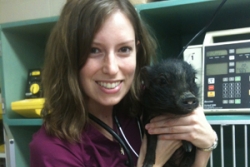
The holiday season has just begun and there are scrumptious cookies, delectable cakes, and feasts of savory turkey waiting just around the corner! During the holidays, we find ourselves not only being thankful for our family, pets, and friends, but also in the spirit of giving.
It can be so hard to say no to those big puppy dog eyes staring at us by the table! Indeed, this is by far the most common season to notice our four legged friends having gastrointestinal (GI) issues— more commonly known as a stomach ache—from table scraps or new treats they are offered with the best of intentions.
When our pets are used to eating one type of food, whether it is canned, grain-free, specialty, or store brand, the body gets used to it and normal bacterial flora grows in the GI tract. This bacteria lives happily in a specific pH that allows balance between health of the intestines and health of the bacteria. It’s actually much more dangerous than you may think to give in and feed Fido even just the smallest piece of juicy seasoned turkey skin!
Seasonings, fat, and just simply a change in diet can cause inflammation of the entire GI tract, and sometimes the pancreas, too. Fido’s body will try to get rid of the new substance by vomiting, which is usually followed by loose stool as it passes through the system.
It changes the pH in the intestinal tract and can kill off the good bacteria, allowing bad bacteria to grow. If there is more than one bout of vomiting or diarrhea, however, it is time to visit the vet. Although I am gearing up for a busy season of gastroenteritis and pancreatitis cases, I hope that we can work together to minimize the GI distress by saying no to the begging this season. Happy Holidays!
Danielle Sawyer is currently a first year resident in emergency and critical care at ACCESS – Los Angeles. As a Michigan State Spartan, Danielle completed a BS in Zoology with a concentration in Animal Behavior and Neuroscience. Electing to attend an off-shore veterinary school in the Caribbean, Danielle earned her DVM degree as a Rossie in 2011. She developed her love of emergency and critical care in an internship at Animal Specialty Group in LA, followed by two years as an overnight emergency veterinarian in Thousand Oaks, CA prior to starting at ACCESS Specialty Animal Hospitals. Dr. Sawyer is and emergency doctor with ACCESS Specialty Animal Hospitals.
